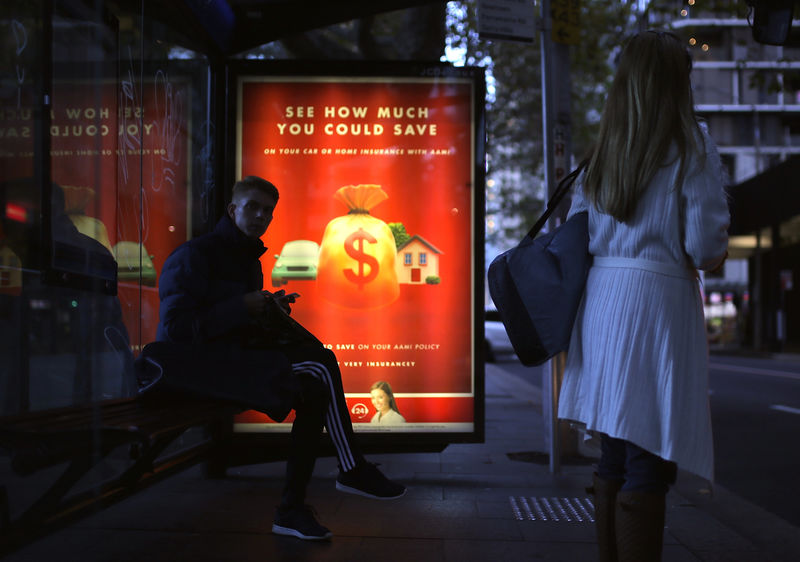* Consumers pessimistic as households fret over finance
* Latest earnings show pick up in revenues, profits at companies
* Coles survey shows cost of living for households has risen
* But wages share of GDP has slumped to the lowest since 1964
By Swati Pandey
SYDNEY, Sept 1 (Reuters) - Australian consumers appear to be down in the dumps even as businesses celebrate the best times in over a decade, a dichotomy that could bring the country's 26-year recession-free run to an unhappy end.
Consumer confidence is at a 16-month low while business conditions are near decade highs - an unprecedented divergence that could well be a stumbling block for Australia's A$1.7 trillion economy. divergence means that while business prospers, wage growth is crawling at its slowest pace ever.
In addition, a 70 percent jump in electricity costs since 2000 has weighed on household budgets at a time when private debt has skyrocketed to 190 percent of disposable income.
Historically, the two data sets have been very closely correlated, with a divergence seen only once around the time of Australia's last recession in 1991 when business confidence grew much faster than the improvement in consumer sentiment.
"Record high energy prices are contributing to inequality. When workers' pay has flat-lined, company profits are soaring, and the cost of everything is going up. People are struggling to afford to survive," said Ged Kearney, president of the Australian Council of Trade Unions. "Working people need a pay rise."
Research by KPMG in 2016 found that more than 157,000 residential customers were in debt to electricity suppliers. Those not able to repay this debt risk disconnection, with approximately 160,000 households disconnected across Australia in 2015/16.
Domestic consumption accounts for about 60 percent of Australia's gross domestic product, so pessimism among consumers is bad for growth.
Economists polled by Reuters believe growth will probably fall short of the Reserve Bank of Australia's (RBA) upbeat forecast of around 3 percent, predicting instead growth of 2.3 percent this year. RBA slashed interest rates twice last year to a record-low 1.50 percent to stoke inflation. It has since stood pat and is widely expected to stay on hold for a long time to come as it juggles slowing household spending and consumer prices with all-time high household debt.
GOING STRONG
The latest earnings round shows that corporate Australia is in good shape. Ninety percent of companies on the benchmark ASX 200 index .AXJO that reported full-year results this month posted a profit and 91 percent issued a dividend.
While revenues are up only 6.5 percent on a year ago, profits have shot up over 62.9 percent and cash holdings have jumped 27 percent, according to analysis by stockbroker CommSec.
Still, the share of wages in the composition of gross domestic product has collapsed to its lowest since 1964.
The present share of wages at under 52 percent of GDP compares to almost 56 percent in 1991, a pay cut that works out to A$70 billion ($53.3 billion) a year, according to Reuters calculations.
Miniscule pay hikes have become a global phenomenon, but Australia - which came out of the global financial crisis relatively unscathed - is now straddled with sub-par growth and discouraged consumers.
In addition, young Australians face a "much more brutish job scenario" than their parents or grandparents ever faced, the Brotherhood of St Laurence advocacy group said in its report titled "Generation Stalled - Young, Underemployed and Living Precariously in Australia".
It said the underemployment rate for 15-24 year olds at 18 percent of the youth labour force is the highest on record, reflecting the precarious nature of work in "gig economy" Australia, which may be hitting even stable businesses such as supermarket chains.
"Despite a period of continuing economic growth and low inflation, many Australian households are experiencing significant pressures on their cost of living," according to a report prepared by NERA Economic Consulting for Coles, Australia's No.2 supermarket.
Coles suffered its first earnings drop in nine years even as parent company Wesfarmers WES.AX posted record profits. Coles survey showed that for households in the bottom 20 percent income bracket the cost of living was estimated to have risen by 8 percent versus a 6.2 percent gain for the affluent.
That means households are cutting down on spending on everything from non-essential items such as entertainment and leisure transport to essential groceries.
Coles boss John Durkan said the supermarket was seeing a shift in consumption from premium to mid-tier or cheaper products.
"We should be concerned that many households feeling cost of living pressures are spending less on fresh produce and fresh meat," he said.
Downbeat consumer sentiment could also worry the ruling Liberal/National coalition which has a precarious one-seat majority in parliament while its standing in opinion polls is at multi-month lows.
Treasurer Scott Morrison said on Thursday that corporate profits had lifted off in the last two quarters, but largely from rising commodity prices.
"Now, we need to see that (rise) sustained and I believe that once you see that sustained productivity and that sustained profit, then that should flow through to wages."
<^^^^^^^^^^^^^^^^^^^^^^^^^^^^^^^^^^^^^^^^^^^^^^^^^^^^^^^^^^^ Australia's weak consumer confidence vs buoyant business conditions
http://reut.rs/2ixhWVt Fewer Australians think it's good time to invest
http://reut.rs/2gacgjk Australia's GDP growth slows, wages rising at record-low pace
http://reut.rs/2gb4dCC Australia's falling disposable income and low inflation
http://reut.rs/2ix3j46
^^^^^^^^^^^^^^^^^^^^^^^^^^^^^^^^^^^^^^^^^^^^^^^^^^^^^^^^^^^>
